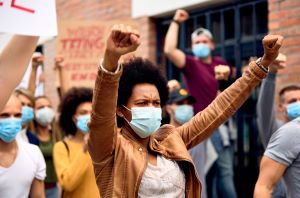
It seems to have become common, over the last decade, that colleges and universities are having to decide to accommodate, or not, those whose opinions are considered hateful. In light of 2020 events, higher education is once again on the cutting edge of defining and attempting to live up to what is meant by “free speech.”
In an upcoming panel session at the 2021 (106th) AACRAO Annual Meeting, Andrew Hannah of the University of Chicago and Erin Mason of the University of Connecticut will share their institutions’ responses to questions about free speech on campus. The session is one of several that will address the impact of 2020 on higher education at this year’s meeting.
Free speech during the COVID-19 pandemic
“The COVID-19 pandemic did not shut down our schools or higher education in general,” said Hannah. “We quickly (and efficiently) morphed to new ways of doing our jobs, especially in the ways we communicate with each other. In a zoom conference call, for example, everybody’s face and opinion is equal—there is no sitting in the back of the room. Social media allows us to remain gainfully employed and involved. But at this same time our country has gone through the most divisive political and social convulsions. The social media we use to do our jobs and remain connected with pretty much everyone is likewise an open invitation to speak our minds, in an ever increasingly public manner.”
Campus conversations
Registrars and admissions officers are key to this conversation, Hannah and Mason noted. “[These roles] are embedded in the business affairs of their schools, and the major trends and topics surrounding higher education affect, in time, our offices and ourselves, too,” Hannah said. “The topic of free speech on college campuses has been the subject of intensifying discussion and debate for a number of years now. As staff of schools that have taken very visible stances in how free speech is defined and defended, we have been front-row witnesses to these debates. As both citizens of our communities and members of our campus administrations we need to consider how our own opinions, personal and professional, may become part of that debate.”
For example, while working as a manager of scheduling, Mason had a personal experience with an event that caused disruption on campus and contributed to a national conversation. Through that experience, she learned how to better manage potentially controversial events. “My hope is that the audience members gain an appreciation of how space allocation and policies around space management can be developed to ensure safety and minimize disruption to the campus community,” she said. “I’d like people to walk away having learned something that they can take back to their campuses to begin, or reboot, important conversations on how we can best serve our institutions as we seek to foster critical thinking, political engagement, and free speech.”
Adopting guidelines
Hannah will discuss the “Chicago Principles,” developed by the Committee of Freedom of Expression in 2014. The principles--which have been adopted by institutions across the country-- address “how freedom of speech at colleges and universities must not only be defined but defended in order for higher education to retain validity in a culture of opposing beliefs, ‘alternate’ facts, and political correct/incorrectness,” Hannah said.
To attend this and other sessions, register for the 2021 (106th) AACRAO Annual Meeting.